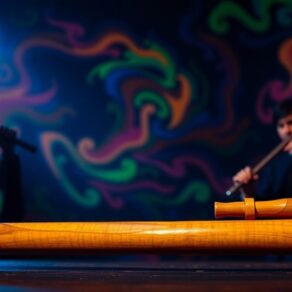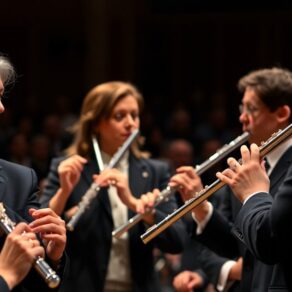Influential flute players like Jean-Pierre Rampal and James Galway transformed music history with their innovative techniques and expressive interpretations. Rampal integrated classical and contemporary repertoires while revitalizing neglected pieces, setting high standards for future flutists. Galway popularized the Irish flute sound, uniting classical and folk genres, and released over 30 albums, enhancing the flute's global appeal. Meanwhile, Paula Robison championed new compositions, enriching the flute repertoire. Robert Dick pushed boundaries with avant-garde techniques, promoting improvisation. These artists not only excelled musically but also nurtured the flute community, leaving a lasting legacy. Explore more about their remarkable journeys and contributions.
Key Takeaways
- Jean-Pierre Rampal revitalized the flute's role in orchestras, blending classical and contemporary repertoire while inspiring future generations through education and recordings.
- James Galway popularized the Irish flute sound, bridging classical and folk traditions, and expanded the flute's global appeal through extensive collaborations and performances.
- Paula Robison championed contemporary composers, revisiting classical literature, and emphasized musicality in teaching, fostering connections within the flute community through performances.
- Robert Dick innovated flute techniques with avant-garde sounds and improvisation, encouraging exploration of new sound possibilities and expanding the flute's expressive capabilities.
- Julius Baker and Emmanuel Pahud's pedagogical approaches shaped future flutists, fostering community and emotional depth in performance through individualized instruction and collaboration.
Jean-Pierre Rampal
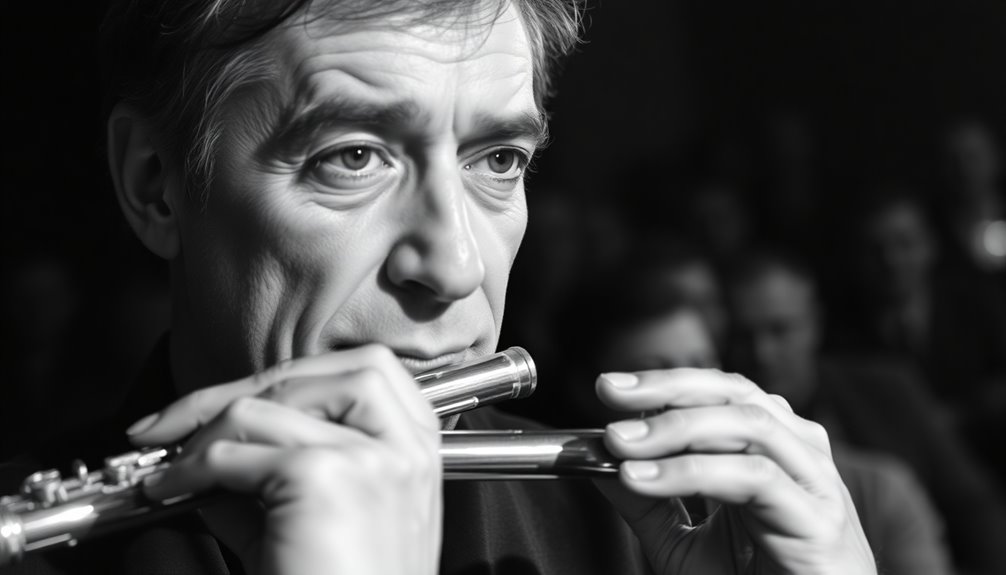
When you think of influential flute players, Jean-Pierre Rampal unquestionably comes to mind. His contributions to the world of music transcended mere performance; they reshaped the perception of the flute itself. Rampal's legacy isn't just about his breathtaking virtuosity but also about how he elevated the flute to a prominent role in orchestras and chamber music.
You'll find that his mastery of flute techniques was groundbreaking. Rampal seamlessly blended classical repertoire with contemporary works, breathing new life into pieces that had long been neglected. His ability to execute complex passages with clarity and expressiveness set a benchmark for aspiring flutists everywhere. By incorporating a range of tonal colors and dynamic contrasts, he made the flute resonate with emotional depth, enthralling audiences globally.
Moreover, you can appreciate how Rampal's commitment to education helped cultivate future generations of flutists. He shared his insights through masterclasses and recordings, ensuring that his innovative approaches to technique and interpretation would endure. His approach to scales, arpeggios, and etudes exemplified the structured learning that is crucial for developing technical skills(#) in aspiring musicians.
As you explore his discography, you'll discover not just music, but a philosophy of sound that encourages you to investigate your own voice on the instrument.
In essence, Rampal's legacy isn't merely his accolades; it's the inspiration he ignites in every flutist who aims to master their craft. His influence continues to resonate, inviting you to embrace the flute's limitless potential.
James Galway
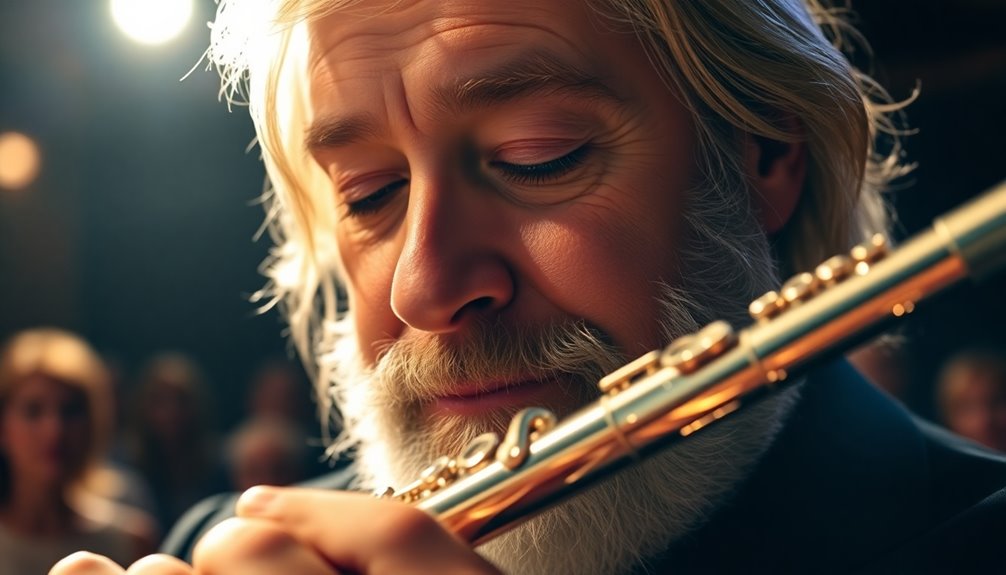
One of the most celebrated flute players of the modern era, James Galway has profoundly shaped the landscape of flute performance and education. From his unique interpretations to his charismatic stage presence, Galway's influence reaches far beyond his Irish roots. You can see how he's inspired generations of musicians, making the flute an integral part of both classical and popular music.
Galway's legacy is marked by his ability to bridge diverse musical genres. He popularized the Irish flute's enchanting sound, bringing traditional Celtic music to a global audience while maintaining the instrument's authenticity. His recordings often showcase a blend of classical repertoire and folk traditions, making them approachable for listeners of all backgrounds. Galway's mastery of articulation techniques enhances his expressive performances, allowing him to convey emotional depth in his music.
Here's a brief overview of Galway's key contributions:
| Contribution | Description | Impact |
|---|---|---|
| Recordings | Over 30 albums, including classical and crossover | Broadening the flute's appeal |
| Educational Outreach | Masterclasses and workshops worldwide | Inspiring future generations of flutists |
| Collaborations | Worked with renowned artists in various genres | Fostering crossover between musical styles |
| Advocacy for Flute Music | Promoting flute repertoire through performances | Elevating the flute's status in the music world |
| Innovation in Technique | Pioneered new techniques for flute playing | Influencing teaching methods globally |
Paula Robison

Paula Robison stands out as a remarkable force in the world of flute performance, renowned for her artistry and commitment to expanding the instrument's repertoire. With a career spanning over five decades, you've likely encountered her innovative spirit in both performance and pedagogy. Robison's Technique is celebrated not just for its technical precision but for its lyrical expression, inviting listeners into a deeply emotive experience.
Robison has championed contemporary composers while also revisiting classical literature, effectively bridging the gap between tradition and modernity. Her collaborations with celebrated composers like Leonard Bernstein and Aaron Copland exemplify her role in Flute Innovations, as she brings new works to life and inspires a generation of flutists to explore uncharted musical territories. You can't help but feel the excitement as she breathes new life into pieces that might otherwise remain overlooked.
Moreover, her dedication to teaching reflects a commitment to nurturing the next wave of flutists, emphasizing the importance of musicality alongside technical skill. As you explore her recordings and performances, you'll notice how she encourages a sense of belonging within the flute community, fostering connections among performers, composers, and audiences alike. Additionally, her work has inspired many to appreciate the superior sound quality produced by quality instruments like the Eavnbaek C Flute.
In a world where the flute often plays a supporting role, Robison's contributions elevate it to new heights, ensuring its place in both historical and contemporary music. By embracing her vision, you can appreciate the profound impact she's had on enriching the flute's legacy and inspiring future musicians.
Sir James Galway
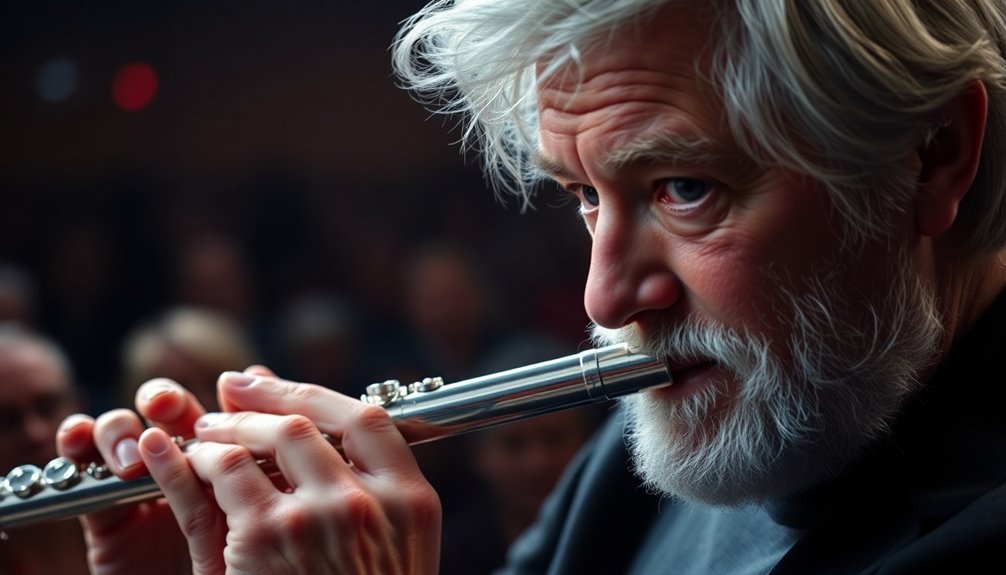
Sir James Galway, often hailed as "The Man with the Golden Flute," has redefined the role of the flute in both classical music and popular culture. His exceptional skill and charisma have made the flute a prominent instrument in diverse musical landscapes. You might find it fascinating how Galway's techniques, such as his unique breath control and tone production, have influenced countless flutists. His ability to blend classical precision with jazz improvisation showcases a versatility that resonates with audiences worldwide.
Galway's collaborations further illuminate his impact on music history. Working with a myriad of artists, from Andrea Bocelli to the Chieftains, he's bridged genres in a way that few flutists have achieved. Each partnership not only enriches his repertoire but also broadens the flute's appeal, allowing you to hear it in contexts you might never have imagined. This willingness to experiment and collaborate speaks to his passion for music and his desire to connect with listeners.
Moreover, Galway's performances are characterized by a warmth and expressiveness that draw you in, making each concert feel intimate and personal. His recordings, whether of classical masterpieces or contemporary hits, invite you to explore the emotional depth of the flute. His artistry often incorporates elements of multiphonics, a technique that expands the flute's expressive capabilities and adds a rich layer to his performances.
In a world where music often feels compartmentalized, Galway reminds you of the instrument's universal language, inviting everyone to join in the celebration of sound. Through his techniques and collaborations, he continues to shape the future of flute playing, inspiring generations to come.
Robert Dick
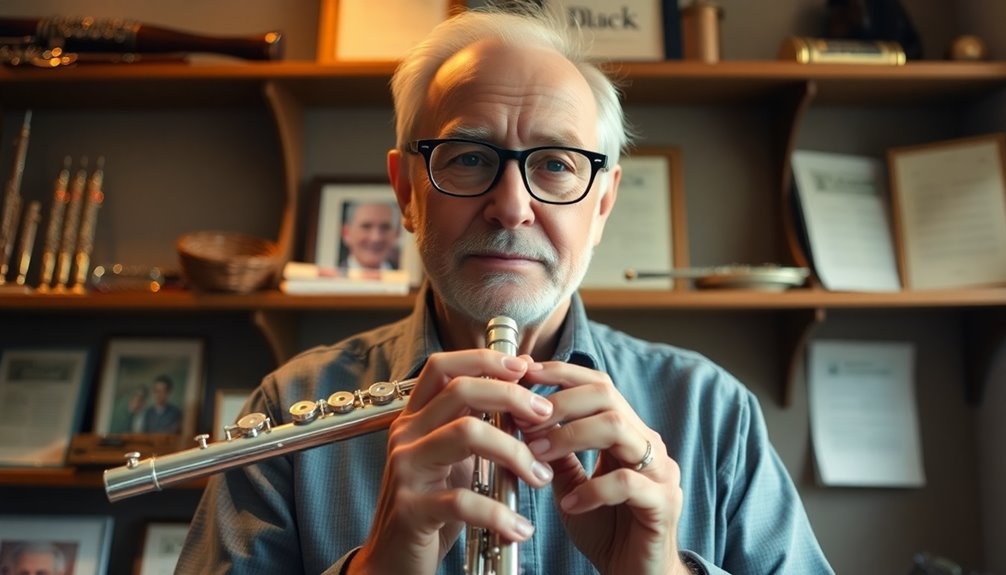
Robert Dick stands out as a revolutionary figure in the world of flute playing, merging traditional techniques with avant-garde innovations. His approach has expanded the boundaries of what's possible on the instrument, making him a key influence for those who crave a deeper understanding of contemporary compositions.
You'll find that Dick's exploration of extended techniques hasn't only redefined flute playing but also opened doors for flutists who seek to express a wider range of emotions and ideas. By incorporating unconventional sounds—like multiphonics, flutter-tonguing, and slap-tonguing—he challenges you to think outside the box.
It's this fearless experimentation that resonates with both performers and audiences, inviting a more dynamic interaction with music. Through his work, you can see how Dick has shaped the landscape of modern flute performance, encouraging flutists to embrace complexity and individuality in their artistry.
Moreover, his compositions often serve as a canvas for these techniques, allowing you to witness the seamless integration of sound and innovation. Dick's focus on improvisation within contemporary compositions fosters a sense of community among flutists, as they gather to share ideas and techniques that push the envelope of traditional playing.
In essence, Robert Dick's influence is profound; he not only enhances your technical skills but also nurtures your creative spirit. By following his lead, you can contribute to the evolving narrative of flute music, ensuring that the art form continues to thrive in exciting, unexpected ways. His dedication to breath control and innovative techniques serves as a testament to the challenges of mastering the flute.
Julius Baker
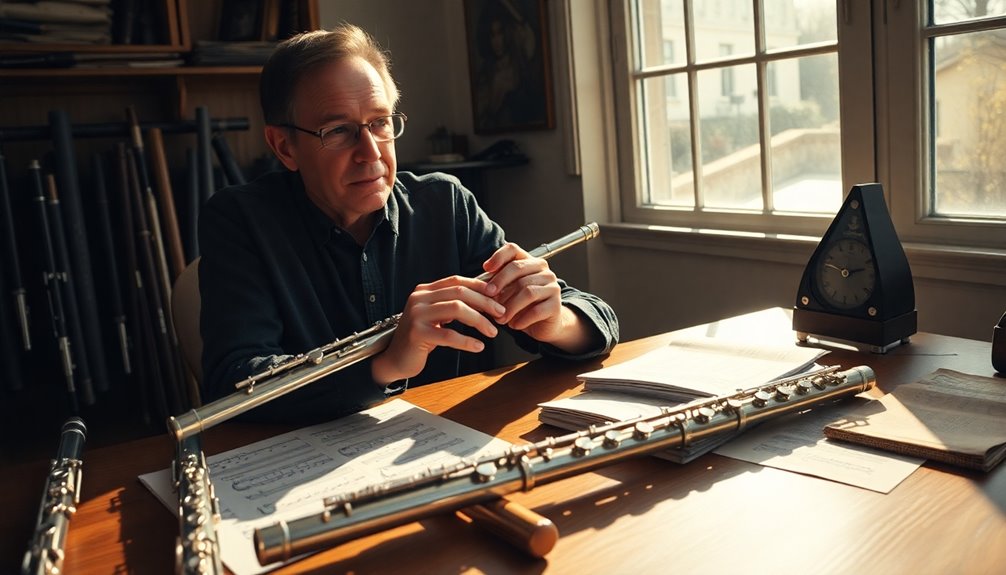
Julius Baker, a pivotal figure in flute pedagogy, reshaped the landscape of flute education through his innovative teaching methods and deep understanding of the instrument. His influence extends far beyond his own performances, as he cultivated a generation of flutists who'd carry forward Baker's legacy with pride and proficiency.
You can see the impact of his teaching in several key areas:
- Individualized Instruction: Baker believed in tailoring lessons to each student's unique needs, fostering a sense of belonging and confidence in their abilities.
- Focus on Sound Production: He emphasized the importance of producing a beautiful sound, instilling in his students an appreciation for tonal quality that transcends mere technical skill.
- Integration of Theory and Practice: Baker's techniques bridged the gap between theoretical knowledge and practical application, ensuring that students understood the "why" behind their playing. He also encouraged students to explore essential accessories like a professional cleaning kit, which ensures their instruments remain in optimal condition for performance.
Through these approaches, Baker not only elevated the standard of flute playing but also created a nurturing environment for his students. His teaching methods laid the groundwork for modern flute instruction, encouraging ongoing exploration and innovation.
Emmanuel Pahud
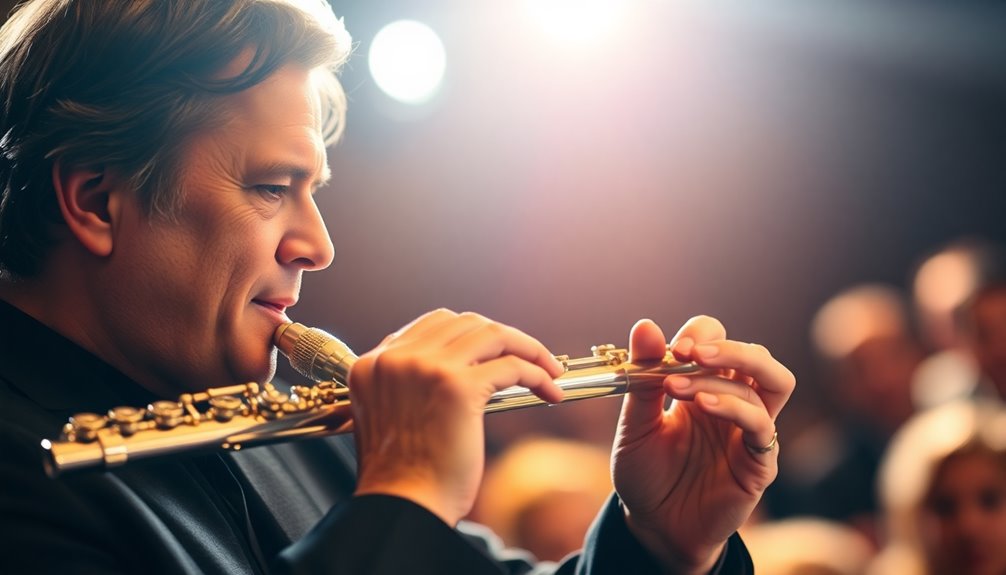
Building on the foundation laid by influential educators like Julius Baker, Emmanuel Pahud stands out as a remarkable flutist and pedagogue in the contemporary classical music scene. His techniques are not only technically proficient but also infused with emotional depth, making his performances resonate with audiences worldwide. You'll notice that Pahud's mastery lies in his ability to blend virtuosity with interpretive nuance.
Moreover, his collaborations with renowned musicians and orchestras have further enriched the classical music landscape. These partnerships showcase his versatility and commitment to pushing the boundaries of flute performance.
To better understand Emmanuel Pahud's impact, here's a concise overview:
| Aspect | Details | Impact |
|---|---|---|
| Techniques | Breath control, articulation, and dynamics | Enhances expressiveness in performances |
| Collaborations | Works with orchestras and chamber ensembles | Expands the repertoire and accessibility of flute music |
| Pedagogical Role | Teaching at prestigious institutions | Inspires the next generation of flutists |
Through these efforts, Pahud not only elevates the flute as a solo instrument but also fosters a sense of community among musicians. His dedication to both performance and education guarantees that the flute continues to thrive in the classical music domain. By engaging with Pahud's work, you join a vibrant community that values both artistry and collaboration. Additionally, his mastery of advanced techniques allows him to navigate complex passages with precision, setting a standard for flutists everywhere.
Frequently Asked Questions
What Are the Differences Between Classical and Contemporary Flute Playing Styles?
When you explore the differences between classical and contemporary flute playing styles, you'll notice distinct technique variations and stylistic influences.
Classical playing often emphasizes precision, tone quality, and traditional fingerings, while contemporary styles incorporate extended techniques, improvisation, and diverse genres.
You'll find that contemporary players experiment with sound and expression, pushing boundaries.
This evolution reflects a broader artistic dialogue, inviting you to appreciate both styles' richness and adaptability in today's musical landscape.
How Can I Start Learning to Play the Flute?
To start learning the flute, focus on the basics.
Begin by familiarizing yourself with flute parts and how to assemble it. Look for beginner resources, like online tutorials or local classes, to guide you through essential techniques.
Practicing scales and simple songs will build your confidence.
Join a community or find a practice buddy to share progress and tips.
What Are the Best Flutes for Beginners to Use?
When you're just starting out, think of finding the right beginner flutes like choosing a trusty sidekick in an epic adventure.
Look for flutes made of durable materials like silver-plated nickel or even student-grade alloys, as these offer a great balance between sound quality and affordability.
Brands like Yamaha and Gemeinhardt provide excellent options, ensuring you'll feel confident and connected to the music as you begin your flute journey.
How Has Flute Technology Evolved Over the Years?
Flute technology's evolved considerably, enhancing your playing experience.
Early flutes were made from wood, but now you'll find options in metal, which offer better projection and durability.
Key mechanisms have also advanced, with modern flutes featuring more complex designs that improve responsiveness and intonation.
These innovations make it easier for you to express yourself musically, allowing for a deeper connection with the instrument and the music you create.
What Are Some Common Challenges Flute Players Face?
Like a ship steering through stormy seas, you'll face challenges as a flute player.
Breath control can be tricky; you must manage your airflow to achieve a rich tone.
Finger technique also poses hurdles, especially during fast passages where precision is key.
You might struggle with coordination and muscle memory, making practice essential.
Conclusion
In exploring the legacies of these influential flute players, you see how their artistry not only shaped music history but also inspired countless musicians. Each flutist, from Rampal's lyrical grace to Galway's vibrant performances, weaves a unique thread in the tapestry of sound. Their contributions resonate like a gentle breeze, reminding us of the power of music to connect hearts and minds. As you reflect on their journeys, you can appreciate how they've transformed the flute into a voice of profound emotion.

